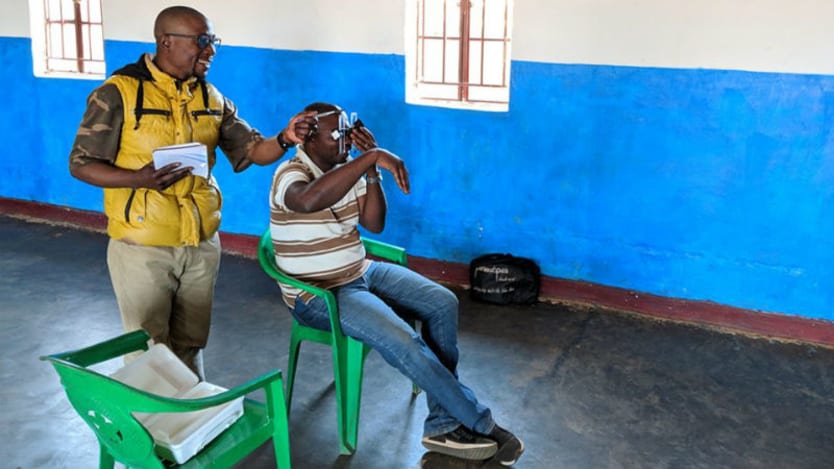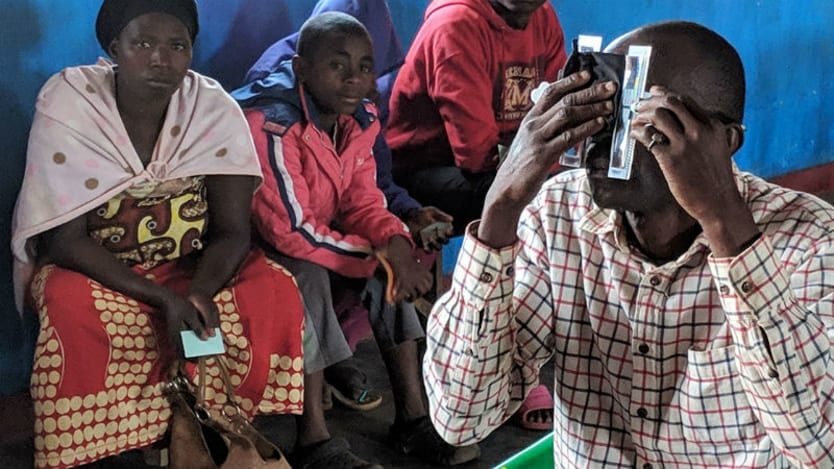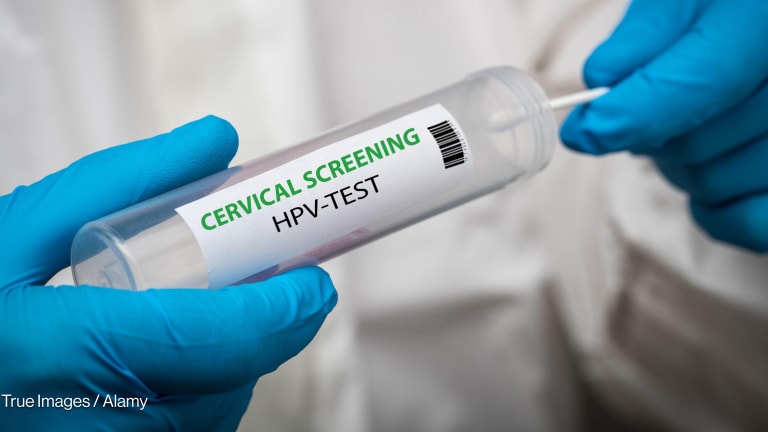
BARCELONA — In Africa, there is an average of one eye health professional for every 55,000 people. In Southeast Asia, there is only one ophthalmologist for every 200,000 people. With limited capacity to screen and provide corrective measures, such as a simple pair of glasses, many continue to live with poor vision.
According to the World Health Organization, uncorrected refractive error — where the eye does not bend light correctly, such as with myopia or astigmatism — is one of the leading causes of vision impairment. A lack of access to eyeglasses is estimated to cost the global economy $227 billion annually from lost productivity.
“We know that eyeglasses make a difference so let's create a system that pushes as far down an echelon of care as we can,” said Kevin White, founder of Global Vision 2020, a nonprofit organization working to eliminate uncorrected refractive error in low-resource settings using portable vision kits.
As part of the kit, White invented a vision-screening tool called USee, which enables people in remote areas to receive screening and a pair of glasses without the need for an eye health professional.
► Using skills-based training as a tool for inclusion
The only self-refraction device on the International Agency for Prevention of Blindness standards list, patients put on the glasses-like device and dial through the lens bar until they reach one that provides clear vision. The color and number on the lens chosen correspond with one in the vision kit that can then be “snapped” together into a pair of eyeglasses by a trained refractionist.
Global Vision 2020 has trained over 1,000 people from their partner organizations — including The Eye Foundation Hospital, OM Ships, Samaritan's Purse, and World Vision — on how to use the kits through a video tutorial and short online test, and distributed 36,000 pairs of prescription eyeglasses in 38 countries. “It’s all about access,” White said.
Speaking to Devex, White discussed the rollout of the tool and challenges faced, including accusations that the approach is unethical.
This conversation has been edited length and clarity.
Following the clinical trials, what is Global Vision 2020’s next step in making the vision kits and vision care accessible to more last-mile populations?
We're selling kits to organizations that can build on this capability. Organizations that are already in the developing world — whether they're training community health workers or running small clinics for malaria medication distribution — can get one of these kits and ... provide [glasses] for less than $5 a patient.
We've only been doing that for about a year and a half. We wanted to get it clinically validated, get it to full-scale production, and now we're trying to streamline our logistics so that we can get that cost lower and make it easier for organizations in-country to get them as opposed to getting them shipped from the U.S. which is a pain.
Are you predominantly focused in more remote and rural communities or urban communities?
Currently, we’re mostly in rural communities because there usually is an eye health component in urban centers. But there's still not a lot of access to folks that live in those urban centers because it's very cost-prohibitive for the majority to get into that system. It really depends on where our partners operate. We're just a provider of a capability so if our partners provide services in the suburbs of Lagos and some of the poorer areas, for instance, then that's fantastic.
It's 100% critical for us to be working with local partners because the main thing we want to do is provide a sustainable solution. For us to go in, give away a pair of eyeglasses, and then leave and not come back is a last resort.
We stress finding a local partner to leave this equipment behind with because it's so easy to learn. It takes about three hours to learn how to use the system and about 10 to 15 minutes per patient to screen them, determine what their prescription is, and make them glasses.
What has the response been since rolling out this innovation?
All very positive: The style of the glasses is nice, the patients get a choice of color, the simplicity of the system.
It does not correct astigmatic correction though, which is a criticism that we acknowledge. If they have a heavy stigmatism, they're someone that you would refer — if a system exists to refer them to ... Once you've identified that they have an eye issue that someone could do something about it, you've given them the knowledge that “oh there's a system that can help me see clearly” and you can push them to that next level. But what we find is that [a large majority] of the folks that need just basic corrective eyeglasses, this system works for them, so we have very high numbers of improvement.

What are some of the challenges that you faced throughout the rollout out of your kit?
The immediate perception of delivering eyeglasses is one of very high complexity. If your mission is a very narrow mission, or you have a left or right lateral limit of what your mission is, the idea of taking on something as complex as eyeglasses is daunting so it's easier just to say no. Getting people aware that it's super easy, efficient, ethical, and that it's been tested has been an uphill battle, but we're getting there.
On the application front, one of the issues that we're having is that there are people in the eye health community that say if you cannot solve 100% of the health issues then it's unethical to go in and do anything, which is a difficult thing for me to grasp ... If you can solve 80% of the problem you go in and solve it and then you try to improve the system to get that last 20%.
Let's say 5% of the problem is trachoma. Our people can't solve trachoma, that [needs] an optic nurse or a surgeon, so what do you do? You find people that can and you work your way into their system or link those two systems up. But there are organizations that say “no that's not ethical, you need to be an optometrist.” I couldn't disagree more.
We task shift so many other things. There are community health workers in Africa doing things that it takes a four-year degree to do in the developed world. We've made every effort to make it as efficient, accurate, and ethical as possible and most of the eye health community agrees with us and is embracing that as well, including the IABP.
Devex, with financial support from our partner Essilor, is exploring challenges, solutions, and innovations in eye care and vision. Visit the Focus on: Vision page for more.








